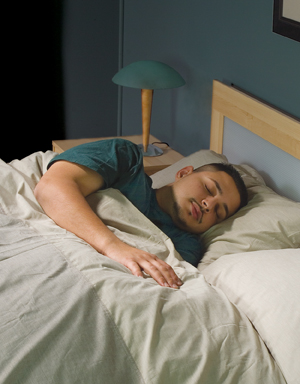Tips to Help Prevent Snoring
Your snoring may get better if you make a few changes in your lifestyle and sleep habits. These changes might be all you need to improve or even cure your snoring. Or they may work best when used along with other types of treatment.
Sleep on your side
Sleeping on your side may keep throat tissue from blocking your air passage. This may improve or even cure snoring. But it can be hard to stop sleeping on your back. Try sewing a pocket or sock onto the back of a T-shirt or pajama top. Put a few tennis balls or a bag of unshelled nuts into this pocket or sock, then wear the shirt to bed. This will help keep you from rolling onto your back. If this doesn't work, try wearing a backpack full of foam pieces. Or put a wedge-shaped pillow behind you. You can also buy devices online that will help you stay off your back during sleep.

Don't use alcohol or certain medicines
Alcohol and medicines such as sedatives and sleeping pills can make breathing slower and more shallow. They also make your muscles relax, so structures in your throat can block your air passage. These changes can cause or worsen snoring. If you snore, don’t use alcohol. Talk with your healthcare provider if you take medicines to help you sleep.
Lose weight
Being overweight often makes snoring worse. Extra weight puts pressure on your neck tissues and throat area, making breathing harder. If you're overweight, ask your provider about a weight-loss program.
Exercise regularly
Exercise can help you lose weight, tone your muscles, and make your lungs work better. These changes may help improve your snoring. Ask your provider about an exercise program like walking, or something else that you enjoy.
Unblock your nose
If something blocks your nose, treating the problem may help improve snoring. Your healthcare provider can suggest medicines for allergies or sinus problems. Nasal saline rinses can also open up the nasal passages. Nasal strips applied on the bridge of the nose can aid breathing. Surgery can straighten a deviated septum. Surgery can also reduce the size of the ridges inside the nose (turbinates) or remove growths (polyps). If you smoke, try to quit. Smoking makes a stuffy nose worse.
These lifestyle changes are often enough to help stop snoring. If the snoring is a problem for you or your partner, there are treatments that may help. These may include:
Talk to your provider to see what is right for you.
Sleep apnea and snoring
Snoring by itself isn't bad for health. But it can be linked to a more serious condition called sleep apnea. Some common symptoms of sleep apnea include:
-
Loud, frequent snoring
-
Daytime drowsiness
-
Trouble breathing during sleep
-
Pauses in breathing while you are asleep
-
Headaches when you wake up
-
Having to wake up often at night to pee
If you're concerned that you might have sleep apnea, talk with your healthcare provider about your symptoms. Ask about tests and treatments that may help.